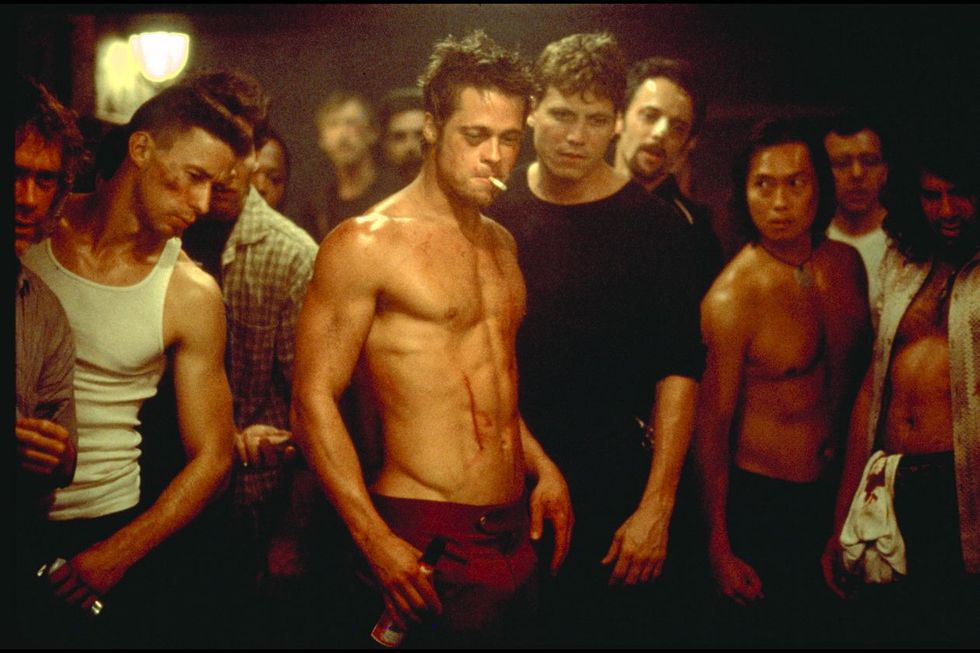This is an analysis that I wrote as an academic paper in which I review a film, not necessarily as an assessment of quality, but, as an analysis of the film's thematic depth, points of potential discussion, etc, and, Fight Club is a film that I have thoroughly mixed feelings about.
Regarding John Campbell’s theory of the monomyth, it’s difficult to correlate the plot of any film directed by David Fincher with the deliberate absurdity of his stylistic and narrative choices including his more coherent and grounded films such as The Social Network (2010). Considering that Fight Club is fairly firmly adapted from a novel by Chuck Palahniuk, one must speculate how convenient the narrative of the book was to follow considering the intricate and complex nature of the film.
Thematic symbolism and religious interpretation is a strong motif throughout the film, and there is a firm foundation for a theory as to what is the source of the cult-like “Fight Club” that Tyler Durden creates and expands on in the film. To preclude earthly items and possessions from meaning and ascend to a higher perception reality is often regarded by many as a characteristic of a peaceful or non-violent religion.
In Fight Club, however, the result of this higher perception is absolute violence and mayhem, as titled the project embarked on by the members of Fight Club.
Upon viewing the film a singular time, it’s difficult to truly comprehend the narrative and how to interpret it without viewing it a second time. Not only does the revelation that Tyler Durden and Edward Norton’s unnamed character are the same person completely obscure one’s perception of the narrative, but, with any film, it’s important to understand each character, and the character that has the most influence on each character’s choices is the story.
In the manner that the narrative is conveyed and the devices employed to do so, the story itself comes across as a character upon further viewings considering the cerebral nature. When a voice-over by Norton’s character (before we learn that he is Tyler Durden) becomes audible, or when Norton’s character breaks the fourth wall and speaks directly to the audience, it doesn’t seem that he is actually speaking with the audience or with an unseen person that Norton's character is relenting the narrative to, but rather, he is speaking directly with the story.
It’s as though he is collecting his thoughts and outlining the events that occur to him in order to remind himself of his course, and he is adhering to a higher and invisible presence.
From this point forward, Norton’s character will be referred to simply as Tyler Durden. When Durden reveals to himself that the person that he has been confiding with in creating a new life since he met him has been the same person as him. The horrific acts that are committed, including setting fire to his own condominium, attempting to motivate a street store cashier by putting a pistol to his head and then destroying the facility, plotting multiple schemes with the Fight Club that involve murder, mayhem, destruction, and, one can’t help but speculate, rape, have always been by Tyler Durden himself, who is Edward Norton's character.
According to the darker and more collected version of Tyler Durden, Durden projected a version of himself that was cooler and more capable to fulfill, however, this doesn’t entirely make sense considering that although the ultra-cool and sporadic version of Tyler Durden is a figment of his own imagination, all of the other occurrences are apparently real.
The arc of Tyler Durden’s character, including meeting himself, forming a relationship with himself whilst formulating a “Fight Club,” and then enduring the revelation that he and the person that he met are the same person can be argued as a classic example of Rene Girard’s concept of Sacrificing and Scapegoating.
The Brad Pitt version of Tyler Durden was cool, calm, and collected, and he also cultivated towards proving himself to be a brilliant criminal mastermind, even if the criminal acts that he conducted were inspired my terroristic motivations. The event that initiated Tyler Durden’s descent into the dark version of himself was the sacrifice of his own condominium and the valuable items from within.
As revealed later in the film, the periods of time that Tyler Durden spent in his transformed state, almost a fugue state, gradually increased. Yes, the darker version of Tyler Durden was a version of himself that he aspired to be, but regarding the filmmakers’ narrative choices, it seemed evident that the events were actually occurring, so Tyler Durden was ostensibly capable of becoming this godlike individual.
He scapegoated by projecting all of his sinister acts onto this imaginary character that Durden expressed a distaste for because of these vile actions. The sacrifice came minutes before the end of the film, when Durden fired a bullet through his mouth, “killing” the darker version of himself, so all previous acts became void considering he had successfully destroyed the originator of the violence and mayhem.
As he held hand with Marla and watched the city explode, all the blood that had been and will be spilled during these bombings was atoned.
With the end of Fight Club, the numerous events that transpired were evidently paralleled with a story from a religious text.
Although there are hardly any biblical echoes (or any more than a Western film would have), numerous instances such as the destruction of his own home which contained worldly possessions which he sacrificed to ascend to a godlike being, and the deliberate chemical burn which initiates one own relationship with pain and suffering echoes with basic themes of Eastern theologies, such as the concept of overcoming pain, attaining higher perception, and precluding oneself from worldly appeals. Along with other aspects, of course, these aspects analyzed are part of the recipe that makes Fight Club a brilliant classic.


















